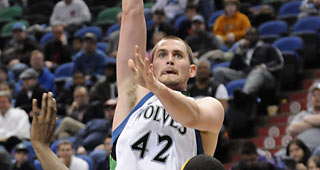One of the challenges of a nuanced issue like contraction is that very few individuals have both the scope and breadth of knowledge to be able to talk about it completely and competently. Furthermore, much of that limited group do not or cannot discuss these issues in a public forum like the Internet. As someone who does not claim to be in this group, I?ll do the best I can.
This piece carried the original intention of discussing LeBron James? original comments, yet the ESPN Insider column by John Holliger warranted mention as well.
Let?s start off with a few points that are getting obscured or misstated:
1. Contraction would improve the quality of the league
Hollinger misplaces his focus on this issue to arbitrary non-issues like the impact of an increase in the population of the United States since the 1980s, though the international impact proves important. The fact of the matter is that individuals who can play in the NBA are needles in a haystack and increasing the size of said haystack affects the quality of the league only marginally. If factors like that are used, bringing up points like the fact that there are more professional sporting outlets now than there were thirty years ago (taking NBA-quality athletes into other sports or leagues) is required.
The more important fact is that taking out any NBA team takes jobs away from some of the worst players in the league while distributing starter and rotation quality players to already existing squads. Talking about population increases wastes time when the basic truth is so readily apparent. Taking out some of the lower-quality guys (not the lowest, thanks to guaranteed contracts) will help, but taking the best players from any NBA squad will improve the quality of minutes played at the top and the bottom by cycling everyone else down. It doesn?t really matter which teams get contracted on this point, as every team has players who would crack rotations elsewhere. Hollinger talks about how wins and losses are a zero-sum game (a worthless point because the only people who quantify team and league quality on wins and losses are people wholly without perspective or sense), yet it?s worth remembering that talent is not a zero sum game.
2. Whether contraction helps or hurts the union is more up for debate than some will have you believe
The first reaction to LeBron?s comments was how they were something that David Stern would love and the union would hate. That has a basis, as having jobs is one component of what the NBAPA should be doing. However, a union whose number one priority is maximizing number of jobs over the quality and security of those positions does their members a major disservice. Giving 20 or so of the worst players in the league jobs in the NBA seems like a strange goal since those guys could clearly play professional basketball elsewhere. Removing any number of worse than average teams would increase the BRI per team and per player while reducing the financial risk, leading to happier owners and a more favorable CBA for the players still in the league.
3. Using other sports/leagues as parallels leads to major problems
Hollinger chose to use other entities like SEC football and the NFL to talk about how expansion can have positive effects. The problem with this is that the way they make money is totally different. The SEC bears nearly none of the financial risk for adding new members since schools handle their own programs. Beyond that, it is easier for the conference to cut bait on bad teams than the NBA and adding college sports teams increases TV revenue while not changing the negligible economic risk. Expansion is a no-brainer in college sports since the market is so different. I?m not even getting into the insanity of comparing contraction to the expansion of March Madness, a post-season tournament that prints money with no BRI components. That?s akin to saying a panther should fly because an eagle can.
Speaking of different markets, using the NFL to reject NBA expansion makes less than zero sense. The NFL is an event sport, meaning each game carried added significance due to a shorter schedule and its role in American sports culture. They also have a much, much better TV deal than the NBA, a hard cap which helps owners, and a much bigger pie to split. Those reasons are also part of the reason the NFL will likely not have a strike while the NBA probably will- having a bigger pie per entity makes it easier to find a split everyone likes and harder to walk away since everyone is leaving more money on the table.
All in all, contraction should be seriously considered by the higher-ups in both negotiating groups instead of whining leading to walk backs of honest input. Contraction would give a more stable economic base to the owners while adding more security to the players still in the league with the added net benefit of improving the overall quality of play and ownership going forward. It would be a shame for silly soundbites like ?Contraction hurts the union? to shape the debate instead of thoughtful, honest, and accurate insight.
Feel free to contact Daniel at Daniel.Leroux@realgm.com or follow him at Twitter.com/DannyLeroux



